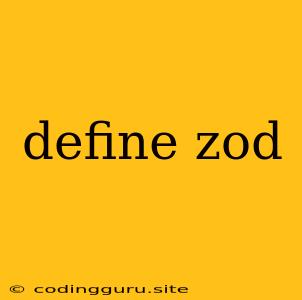What is Zod and Why Do We Need It?
Zod is a powerful TypeScript library that provides a robust and type-safe way to validate data in your applications. It's essentially a schema validator that enforces data structures and ensures that the data you receive and manipulate conforms to your expectations. This is crucial for building reliable and maintainable applications, especially when working with data from external sources or user input.
Why Use Zod?
You might be asking, why not just use TypeScript's built-in type system? While TypeScript is excellent for static type checking, it doesn't offer validation at runtime. That's where Zod steps in.
Here are some key benefits of using Zod:
- Data Validation at Runtime: Zod validates your data at runtime, catching errors and inconsistencies early on.
- Improved Code Readability: Zod schemas are declarative and easy to read, making your code more understandable and maintainable.
- Type-Safe Operations: Zod seamlessly integrates with TypeScript's type system, ensuring type safety throughout your application.
- Comprehensive Error Handling: Zod provides helpful error messages that clearly pinpoint validation issues, simplifying debugging.
- Flexible Schema Definition: Zod allows you to define complex schemas with various data types, including primitives, arrays, objects, and custom types.
How Does Zod Work?
Zod uses schemas to define the structure and types of your data. These schemas are essentially blueprints that dictate the rules your data must follow.
Let's break down the process:
- Define Your Schema: You use Zod's functions (e.g.,
z.string(),z.number(),z.object()) to create a schema that represents the desired data structure. - Validate Your Data: When you receive or process data, you use Zod's
safeParseorparsefunctions to validate it against your predefined schema. - Handle Validation Results: Zod's validation functions return an object containing the validation result and any errors encountered. You can then handle these results accordingly.
Simple Zod Example
import { z } from 'zod';
// Define a simple schema for a user object
const userSchema = z.object({
name: z.string(),
age: z.number(),
});
// Example user data
const userData = {
name: 'John Doe',
age: 30,
};
// Validate the user data
const validationResult = userSchema.safeParse(userData);
// Check for validation errors
if (validationResult.success) {
// Data is valid, proceed with your logic
console.log('User data is valid:', validationResult.data);
} else {
// Data is invalid, handle the errors
console.error('Validation errors:', validationResult.error.issues);
}
Advanced Zod Features
Zod offers numerous advanced features for defining complex and custom validation logic. Here are a few examples:
- Custom Validation Functions: Create your own validation functions to enforce custom rules on your data.
- Data Transformation: Use Zod's
transformproperty to modify your data before validation. - Array Validation: Validate arrays of objects using
z.array()and nested schemas. - Optional Fields: Mark fields as optional using
z.optional()orz.nullable(). - Conditional Validation: Apply validation rules based on the values of other fields.
- Enums: Define and validate data against a set of pre-defined values using
z.enum().
Conclusion
Zod is a powerful tool for ensuring data integrity and improving code quality in TypeScript applications. Its ability to validate data at runtime, provide clear error messages, and integrate seamlessly with TypeScript's type system makes it an invaluable asset for any developer working with complex data structures. By embracing Zod, you can build more reliable, maintainable, and robust applications.
